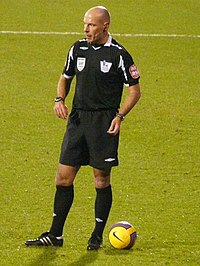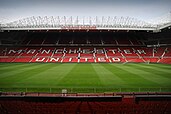Portal:Association football
| Main page | Categories & Topics | WikiProjects & Things you can do |
The Association football portal

Association football, more commonly known as football or soccer, is a team sport played between two teams of 11 players each, who almost exclusively use their feet to propel a ball around a rectangular field called a pitch. The objective of the game is to score more goals than the opposing team by moving the ball beyond the goal line into a rectangular-framed goal defended by the opposing team. Traditionally, the game has been played over two 45-minute halves, for a total match time of 90 minutes. With an estimated 250 million players active in over 200 countries and territories, it is the world's most popular sport.
The game of association football is played in accordance with the Laws of the Game, a set of rules that has been in effect since 1863 and maintained by the IFAB since 1886. The game is played with a football that is 68–70 cm (27–28 in) in circumference. The two teams compete to score goals by getting the ball into the other team's goal (between the posts, under the bar, and fully across the goal line). When the ball is in play, the players mainly use their feet, but may also use any other part of their body, such as their head, chest, and thighs, except for their hands or arms, to control, strike, or pass the ball. Only the goalkeepers may use their hands and arms, and that only within the penalty area. The team that has scored more goals at the end of the game is the winner. There are situations where a goal can be disallowed, such as an offside call or a foul in the build-up to the goal. Depending on the format of the competition, an equal number of goals scored may result in a draw being declared with 1 point awarded to each team, or the game goes into extra time or a penalty shoot-out.
Internationally, association football is governed by FIFA. Under FIFA, there are six continental confederations: AFC, CAF, CONCACAF, CONMEBOL, OFC, and UEFA. Of these confederations, CONMEBOL is the oldest one, being founded in 1916. National associations (e.g. The FA in England) are responsible for managing the game in their own countries both professionally and at an amateur level, and coordinating competitions in accordance with the Laws of the Game. (Full article...)
Selected article
The ground, given the nickname the Theatre of Dreams by Bobby Charlton, has been United's permanent residence since 1910, with the exception of an eight-year absence from 1941 to 1949, following the bombing of the stadium in the Second World War. During this period, the club shared Maine Road with local rivals, Manchester City. The ground underwent several expansions in the 1990s and 2000s, most notably the addition of extra tiers to the North, West and East stands which served to return the ground almost to its original capacity of 80,000. Future expansion is likely to involve the addition of a second tier to the South Stand, which would raise the capacity to over 90,000. The stadium's current record attendance was recorded in 1939, when 76,962 spectators watched the FA Cup semi-final between Wolverhampton Wanderers and Grimsby Town. (Full article...)
Selected biography
Goater's first professional club was Manchester United, but he did not reach the first team, making his League debut in 1989 after moving to Rotherham. He played for Rotherham for seven years before moving to Bristol City in 1996. Two years later he moved to Manchester City for a fee of £400,000.
He is most well known for his time at Manchester City, where he scored over 100 goals between 1998 and 2003, finishing as the club's top scorer for four consecutive seasons. After leaving City, Goater had spells with Reading, Coventry and Southend United, before retiring in May 2006.
A former member of the Bermudian national team, Goater returned to Bermuda on retirement, receiving an official welcome from Prime Minister Alex Scott on his arrival. Since 2003, he has organised the annual Shaun Goater Grass-roots Soccer Festival, a football coaching event for children on the islands. (Full article...)
Selected association
The Football Association (the FA) is the governing body of association football in England and the Crown Dependencies of Jersey, Guernsey and the Isle of Man. Formed in 1863, it is the oldest football association in the world and is responsible for overseeing all aspects of the amateur and professional game in its territory.
The FA facilitates all competitive football matches within its remit at national level, and indirectly at local level through the county football associations. It runs numerous competitions, the most famous of which is the FA Cup. It is also responsible for appointing the management of the men's, women's, and youth national football teams. (Full article...)
Did you know (auto-generated) -

- ... that Welsh footballer Jon Morgan went on to become a college principal after retiring?
- ... that Ryan Roberts, a defensive end for Notre Dame, was a soccer player in high school?
- ... that after his soccer career, Steve Palacios enlisted in the United States Army and played for the United States Armed Forces soccer team?
- ... that goalkeeper Sophie Whitehouse, who has lived in England, Africa and the US, has been chosen to play soccer for the Republic of Ireland?
- ... that Carlton Town F.C., now competing at the eighth tier of the English football pyramid, was once denied promotion by a hat-trick scored by future England international Jamie Vardy?
- ... that Ecuadorian footballer Hernán Galíndez won a bicycle for beating a team featuring Lionel Messi when they were children?
Selected image

Selected quote
General images -
Selected World Cup
The 1950 FIFA World Cup was the 4th edition of the FIFA World Cup, the quadrennial international football championship for senior men's national teams. It was held in Brazil from 24 June to 16 July 1950. It was the first World Cup tournament in over twelve years, as the 1942 and 1946 World Cups were cancelled due to World War II. Italy, the two-time defending champions, were eliminated in the first round for the first time in history. Uruguay, who had won the inaugural competition in 1930, defeated the host nation, Brazil, in the deciding match of the four-team group of the final round, causing what is sometimes known as one of the biggest upsets in sports history, occasionally called the Maracanaço. This was the only tournament not decided by a one-match final. It was also the inaugural tournament where the trophy was referred to as the Jules Rimet Cup, to mark the 25th anniversary of Jules Rimet's presidency of FIFA. (Full article...)
Selected topic
More did you know -
- ... that thousands of football players are trafficked every year? (7 February 2021)
- ... that after his side won the 2008 Football League One play-off Final, Doncaster Rovers manager Sean O'Driscoll said he could "murder a cup of tea"? (9 February 2021)
- ... that the East Bengal Ultras, founded in 2013, became India's first ultras group? (29 March 2021)
- ... that after winning the 2004 Football League Second Division play-off Final, some of the Brighton & Hove Albion players dropped the trophy while celebrating and damaged it? (2 March 2021)
- ... that the French football club GPSO 92 Issy was founded by three Peruvian sisters in 1997? (8 April 2021)
- ... that Duncan Jupp scored his first league goal for more than a decade in the 2005 Football League Two play-off Final? (2 April 2021)
Association football portals
More sports portals
Associated Wikimedia
The following Wikimedia Foundation sister projects provide more on this subject:
-
Commons
Free media repository -
Wikibooks
Free textbooks and manuals -
Wikidata
Free knowledge base -
Wikinews
Free-content news -
Wikiquote
Collection of quotations -
Wikisource
Free-content library -
Wikiversity
Free learning tools -
Wiktionary
Dictionary and thesaurus





















































